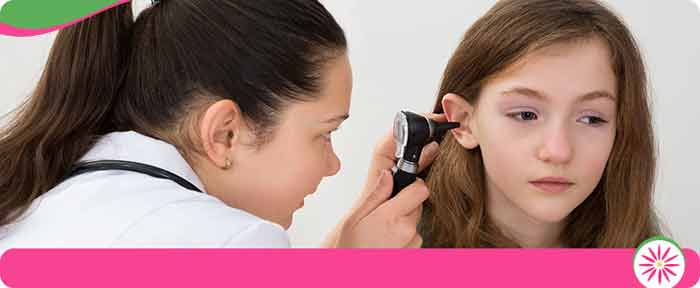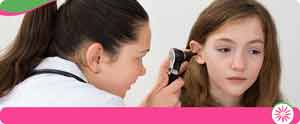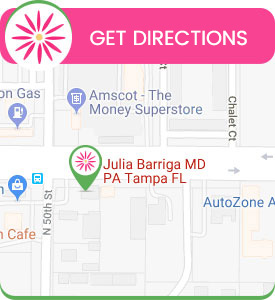Pediatric Hearing and Vision Screening in Tampa, FL
At Julia Barriga M.D. P.A., our pediatric specialists offer pediatric hearing and visual screening to identify and diagnose disorders and abnormalities in children. Early detection is crucial since hearing and visual impairments can hinder a child’s ability to progress and are often overlooked. It is essential to take a proactive approach, as without a screening test, a problem may not be detected until a child develops serious educational or medical problems. We believe in providing comprehensive care for the health and well-being of our young patients. For more information, please contact us or request an appointment online. We are conveniently located at 5001 East Busch Blvd Tampa, FL 33617.


Table of Contents:
When should I be concerned about my child’s hearing and/or vision?
What happens during vision and hearing screenings?
How do you screen newborns for vision and hearing?
It can be quite difficult to know what is normal and abnormal with regard to the development of your child’s vision and hearing! At Julia Barriga, we want to help take some of that uncertainty and stress from you by providing you with answers regarding your child’s hearing and vision development. Our pediatricians will provide you with excellent pediatric hearing and vision screenings!
This is a great question! The signs of hearing and vision problems in your child will change as they get older and will also be easier to identify as they age. For that reason, it is important to bring your child in for an annual hearing and vision screenings especially when they are very young so that you can know if your child’s hearing and vision are developing well or if there are concerns to address. You might also have a reason for concern if you have a history of hearing or vision conditions in your family such as glaucoma, retinal dystrophy or degeneration, retinoblastoma, or other conditions.
Signs that your child’s hearing is developing well as an infant are if they get startled or cry at loud sounds and are soothed by your voice. After about three to six months, they should be reacting to your voice and turning their eyes and head in the direction of the sounds they hear. By six to ten months, they should respond to their own name and attempt to imitate the sounds they hear. Over the next nine months, they should start to locate or point to familiar objects when they are asked, identify things, understand simple sentences, use a few single words, and follow simple spoken directions.
As for vision, a newborn’s vision is working properly if they blink in response to bright light and stare at objects that are eight to ten inches away from their face. After a month, they should be attracted to faces and pictures with lots of black-and-white contrast, and they should also start to closely watch their parents. Over the next four months, they should start to look at their hands, follow light, faces, objects, and begin to reach for objects or bat at them. They may also start to look at themselves in the mirror. After five to seven months, they should start turning their heads to see objects and pick up objects. During the course of the next five months, their depth perception should develop, and they should start playing peekaboo and watching fast-moving objects.
It is normal to want to know what your child will have to do in a vision and hearing screening! The kinds of tests that are used in vision and hearing screenings differ according to the age of the patient and their specific needs. The first thing that happens at any vision and hearing screening is a discussion about the child’s medical history and their family’s medical history. After this, an observation of the child’s eyes or ears will be conducted to see if there are any visible irregularities. Then, various tests will be performed.
For vision screening, tests include binocular fix and follow for children between the ages of four months and three years to check eye movement; the corneal light reflex for toddlers and children to check for strabismus; the unilateral cover test both near and at distance for children aged six months and older to assess ocular alignment in one’s primary gaze; and visual acuity screening for children aged three to five to check the clarity of vision and detect amblyopia, anisometropia astigmatism, and myopia.
For hearing screening, tests include otoacoustic emission (OAE) and automated auditory brainstem response (AABR) for newborns, as well as pure-tone testing, bone-conduction testing, speech testing, tympanometry, and acoustic reflex testing for toddlers and children.
This is a common question, as it takes some unique tests to be able to discern the health of a child’s vision and hearing! For vision screening, we test the newborn’s response to light to see whether or not they will blink, their pupil response to a penlight to see how much it dilates, their ability to follow a target such as a toy or an image, and visually evoked response testing. With visually evoked testing, the infant is connected to a special monitor through various attachments on their head. This monitor records the electrical activity of the infant’s brain after they see the lights or patterns.
Hearing screening for infants is performed by either the otoacoustic emission test or the automated auditory brainstem response. With the OAE test, a tiny probe is placed inside the newborn’s ear canal, which measures the soundwaves that are produced in their inner ear from clicks or tones that are played in the newborn’s ear. With the AABR test, soft earphones are placed inside the newborn’s ear, which plays various clicks and tones. Three electrodes are placed on the newborn’s head to measure the response of the brain and nerves to the sound.
If you would like to learn more about our pediatric hearing and vision screening at Julia Barriga MD in Tampa, Florida, or would like to bring your child in for an appointment, we would be happy to hear from you! You can contact us or you can conveniently book an appointment on our website. Our pediatric clinic is conveniently located at 5001 East Busch Blvd Tampa, FL 33617. We are open during the hours of 8:00 AM to 6:30 PM from Monday to Thursday, 8:00 AM to 1:00 PM on Friday, and 9:00 AM to 1:00 PM on Saturday. We serve patients from Tampa FL, Terrace FL, Thonotosassa FL, Lutz FL, Greater Carrollwood FL, Lake Magdalene FL, Westchase FL, and Town ‘N’ Country FL.
Check Out Our 5 Star Reviews


Additional Services We Offer
- Dental Fluoride Varnish
- Newborn Care
- Vaccines/Immunizations
- Health Education & Counseling
- Physical Examinations
- Hearing & Vision Screening
- Management of Chronic Conditions
- Comprehensive Well Visits
- Asthma Management
- Diabetes Management
- ADD/ADHD Management
- Diagnostic Services
- Ear Piercing
- Prenatal Consults
- In House Lab Testing
- Get Acquainted Consults
- Covid Testing
- Flu Testing
- RSV Testing








